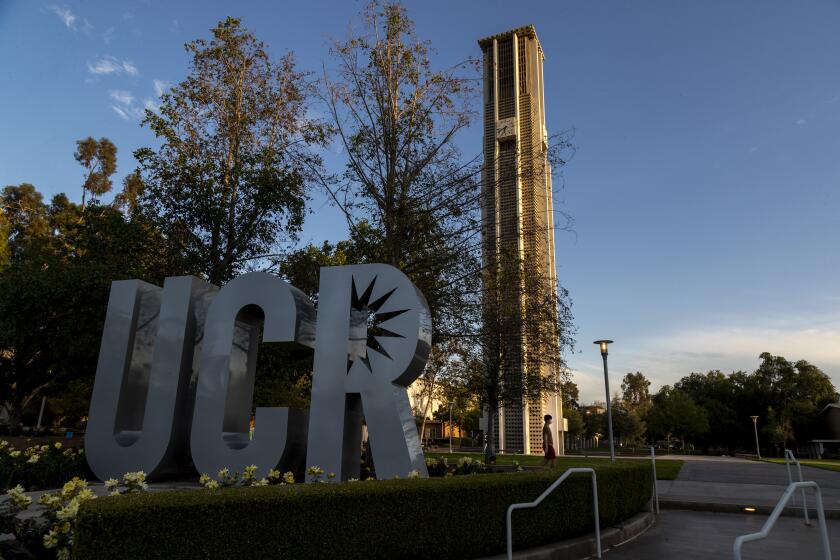Clinton Logging Plan Runs Into a Buzz Saw of Foes
President Clinton, vowing to “break the logjam” over timber harvests in the Pacific Northwest, on Thursday unveiled a $1.2-billion plan to limit logging in the region. It was met with a torrent of angry recriminations from both environmentalists and logging interests throughout Washington, Oregon and California.
The debate over protecting the ancient habitat of the endangered spotted owl has been “a drama that has paralyzed the Pacific Northwest for too long,” Clinton said.
“The main virtue of our plan, besides being fair and balanced, is that we attempt to answer the questions and let people get on with their lives.”
In Congress, disgruntled lawmakers signaled that they might fight Clinton’s plan with legislation that would both raise limits on tree-cutting and thwart future environmental lawsuits by exempting the harvests from existing laws.
Sen. Mark O. Hatfield (R-Ore.) said the plan “looks like an economic development plan for lawyers.”
And American Forest and Paper Assn. Vice President Mark Rey, calling the plan “one of the most litigation-prone exercises that I have ever encountered,” vowed to sue on at least 10 separate counts to block it from taking effect.
“As an industry, we were trying to work with the Administration and sue for peace,” Rey said, “but it is unfortunate (and) now we’re just going to have to sue.”
Bruce Hamilton, conservation director of the Sierra Club, said: “This is not a plan for preservation. It’s basically a plan to continue logging in the last remaining ancient forests. The plan they have in mind even allows logging in spotted owl habitat.”
Under the plan, logging on federal lands west of the Cascade Mountains would be limited to 1.2 billion board feet per year for the next 10 years, roughly 75% less than the peak harvests of the last decade. But environmentalists’ requests for permanent reserves of old-growth forests were rejected.
The Administration has estimated that its plan will cost 6,000 jobs beyond the thousands already lost in the logging industry.
In an effort to mitigate that effect, Clinton signed a separate bill Thursday that would block the export of raw logs harvested from federal lands.
In Washington state alone, which has the largest share of the region’s public-lands timber harvest, some 6,000 jobs depend on the milling-and-wood-products industry that would be lost if such logs were shipped abroad, as most were before 1990.
In addition, Clinton said his initiative would provide an extensive jobs program to retrain more than 16,000 displaced loggers and put another 15,000 to work.
The Administration said it would submit a detailed version of its plan to U.S. District Judge William Dwyer of Seattle, who had given the U.S. Forest Service until July 16 to complete a draft environmental-impact statement. Dwyer, concluding that the government had been illegally over-harvesting the trees on public lands, issued a ban on the sale of such timber in March, 1991.
He ordered the ban to remain in effect unless the federal government came up with a plan by the end of this year to protect endangered species on the lands.
Interior Secretary Bruce Babbitt and Agriculture Secretary Mike Espy flew to Portland, Ore., on Thursday to defend the plan.
Babbitt warned those who would alter the plan that “we will continue to have discussions, but those discussions will focus on implementation--not on the fundamental composition of the plan.”
In a strong signal to opponents that his plan will stand up to court challenges, Clinton warned that it “is clearly scientifically sound, ecologically credible, and legally defensible.”
Environmentalists said they would try to redress their remaining concerns about the plan during a 90-day comment period set to begin July 16.
But Kevin Kirchner, an attorney for the Sierra Club Legal Defense Fund, said his group would not rule out filing a lawsuit if the Administration retains a provision that would allow the cutting of trees within virgin ancient forests.
“That’s going to be a big problem for us,” Kirchner said of the Administration’s proposal to permit thinning and salvaging of trees throughout the 8.6 million acres of federal lands west of the Cascade Range, including untouched areas of ancient growth.
Sami Yassa, a staff scientist for the Natural Resources Defense Council in San Francisco, said the Administration’s failure to limit tree-cutting on vast federal lands east of the Cascades may prompt his group to sue for a halt in logging there.
However, Clinton holds several trump cards in defense of his plan.
Congressional sources said a bid to legislate higher timber harvests and to exempt the harvests from environmental laws would likely fail in the Senate, where environmental interests are powerfully represented.
Environmental attorneys and Administration officials also predicted that court challenges are likely to fare little better.
Officials said that in drafting the proposal to protect the habitat of the spotted owl, the Administration firmly adhered to the conclusions of a team of 37 respected scientists. Because of that, they predicted, few judges would reject the government’s conclusions and find in favor of challengers.
Once they recognize that, the officials reckoned, attorneys for environmental groups will be discouraged from filing suits to delay implementation of Clinton’s plan.
In addition, the combatants’ weariness over years of impasse is contributing to a grim realization on the part of many that this compromise is as much as either side will ever get.
“The people in our timber towns are tired of political promises that cannot be kept,” said Sen. Patty Murray (D-Wash.). “It is time for change. It is time to make tough decisions and redefine our forest-resources policies to reflect the realities of sustainable development and environmental health.”
However, in Northern California, where as many as 900 jobs could be lost because of the President’s initiative, there was considerable fight left.
Gil Murray, vice president of the California Forestry Assn., said Clinton’s 75% reduction in the annual harvest would be disastrous for logging communities in the state.
“This isn’t going to end any timber wars,” he said. “That’s going to devastate rural Northern California. We’ve closed 67 mills in this state already.”
Staff writers Richard C. Paddock in San Francisco, Doug Conner in Seattle, and Paul Richter and Greg Miller in Washington contributed to this story.
Forest Protection Plan
Highlights of President Clinton’s Northwest forest protection plan: * Allows logging of about 12 billion board feet of timber over 10 years, or about 1.2 billion board feet annually on the federal lands in the region that produced more than 4 billion a year during the 1980s. * Asks Congress to spend $1.2 billion over five years, including $270 million in the coming year, to assist the region’s economy. It includes economic development grants, small-business zones, job training money and funds to put some loggers to work restoring rivers damaged by excessive logging in the past. * Asks Congress to encourage more domestic milling by eliminating a tax subsidy for timber companies that export raw logs. * Establishes protective reserves for the threatened northern spotted owl, where limited logging of dead and dying trees and thinning of some live trees would be permitted, but only where it would pose no threat to the bird. * Sets up special management areas where experimental harvesting techniques would be used. * Establishes no-logging buffer zones around sensitive streams and protects entire watersheds in an effort to head off future endangered-species listings of salmon and other wildlife. Source: Times wire reports
More to Read
Start your day right
Sign up for Essential California for news, features and recommendations from the L.A. Times and beyond in your inbox six days a week.
You may occasionally receive promotional content from the Los Angeles Times.






